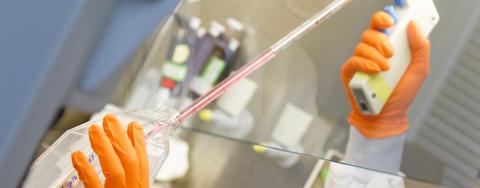
Research Unit on Cardiovascular Diseases
MRSU 1166
-
Unité de recherche
The UMR 1166, created in 2014, brings under the same umbrella five teams dedicated to the research on cardiovascular and metabolic diseases, with internationally recognized and complementary expertise in genomics, biostatistics, molecular and cell biology, physiology and pharmacology.
The unit has played a major role in the creation of the IHU-ICAN (Institut Hospitalo-Universitaire-Institute of Cardiovascular and Nutrition Diseases), one of the six IHU created in France. The IHU-ICAN has provided unique core facilities for clinical research and human bio-resources in the field of cardiovascular and nutrition diseases. We are also member of the Fédération des Recherches Interdisciplinaires Pitié-Salpêtrière (FRIPS). FRIPS brings together four research units, 400 researchers and staff, located in the same building and who mutualize core facilities, lab spaces and foster a multidisciplinary scientific life.
Our scientific project is organized around four main axes: atherothrombosis and coronary diseases, genomics of cardiomyopathies and heart failure, atrial fibrillation and cardiac arrhythmias, lipids and atherosclerotic vascular diseases.
Our two major goals are:
- the identification of new individual pathological phenotypes with shared pathways that will be targeted for intervention integrating the multifactorial and multi-organ nature of these disorders;
- the identification of the earliest molecular and cellular stages, which would allow early prevention to delay the occurrence of the disease or of its complications.
Cardiomyopathies and Channelopathies, which constitute the two major subgroups of Hereditary cardiac diseases, are the leading causes of sudden cardiac death and heart failure in young patients (<40 years) especially in athletes. For more than 15 years our group has been involved in deciphering the genetic and cellular mechanisms underlying the development of cardiomyopathies and channelopathies. We have recently identified new rare or frequent genetic variants involved in these diseases through genome wide association or sequencing strategies. Underlying signaling pathways are studied and new therapeutic approaches are starting based on the new knowledge. Meantime, translational approaches including genetic testing and high throughput resequencing have been developed in clinical practice in order to improve medical management of patients and their families through personalized medicine.
Our main goal is to improve knowledge in cardiovascular medicine from treatment strategies to education for primary prevention. Our cardiovascular research is broad going from in vitro experimental models to randomized clinical trials. It has always been focused on the same objectives, but projects have been diversified. Our group is made of practicing MDs who have interrupted their clinical career to be trained in clinical or basic medical science abroad. Expanding of the group led to new areas of investigation including now cardiovascular epidemiology, education but also new technologies. Our main areas of expertise are the following:
- New models for experimental thrombosis ;
- Demonstration of the prognostic role of biomarkers ;
- Comparative evaluation of antithrombotic thérapies ;
- Reassessment of antithrombotic drug regimens ;
- PK and PD models for drug evaluation ;
- Phase 1 study for oral antithrombotic treatment ;
- Use of metanalysis techniques ;
- Clinical and biological registries in atherothrombosis ;
- Core laboratory for angiography and biology ;
- Student tuition (Masters and PhD)(n=20) ;
- Randomized trials (action-coeur.org).
We aim at understanding the drivers of the molecular and cellular plasticity that characterizes cardiovascular remodeling during atrial fibrillation, heart failure, senescence and pulmonary hypertension.
Our projects focus on:
- the plasticity of cardiovascular tissues cellular composition. We notably study the capacity of progenitor and stem cells to be recruited, to differentiate in various mesenchymal cell lineages and to contribute to atrial and vascular remodeling;
- the plasticity of macromolecular protein complexes regulating cardiac function and their role in pump dysfunction and arrhythmias. We focus on the regulation of ion channels trafficking and targeting in cardiomyocytes;
- the role of cellular metabolic shifts in regulating myocardial remodeling and atrial electrical properties;
- the role of immune and inflammatory cells during cardiovascular remodeling leading to heart failure. We study the mechanisms of macrophages protective role during early adaptive cardiac hypertrophy;
- the role of oxidative stress and inflammation during age-associated cardiovascular remodeling and transition to heart failure;
- the role of the GCN2 gene mutation in the development of Pulmonary Veno-Occlusive Disease, a specific form of pulmonary hypertension.
Cardiovascular diseases (CVD) still remain the major cause of mortality worldwide due to the growing prevalence of obesity and associated metabolic disorders, including insulin resistance and Type 2 diabetes. Dyslipidemia characterized by altered circulating concentrations of lipoproteins and lipids is a major component in the development of CVD. Mechanisms through which lipids contribute to the development of metabolic disorders are multiple and involve complex signalling and regulation pathways at the both cellular and systemic levels. Deciphering of dysfunctional lipid metabolic pathways may therefore help to identify new therapeutic targets to prevent or hamper the occurrence and development of CVD. In this context, our research team aims to propose new candidate pathways, genes and biomarkers in CVD.
The research team is focused on the study of mononuclear phagocytes in the context of cardiometabolic diseases. The team main objective is to better understand how different mononuclear phagocytes subsets impact on chronic metabolic disorders, with particular emphasis on macrophages and dendritic cells. To this aim, unique mouse models and pre-clinical approaches are used to decipher the complex interactions between mononuclear phagocytes subsets and metabolic tissues. In addition, this team builds on recent findings evidencing an interplay between phagocytes, the intestinal microbiota and lipid as well as carbohydrate metabolisms in the host.
Director
-
Wilfried LE GOFF
General secretary
-
Estelle Mendès
-
06 03 06 53 16
Autres tutelles
- Institut National de la Santé et de la Recherche Médicale | INSERM
- Sorbonne Université
Contact details
Adresse physique
75013 Paris
Adresse postale
75013 Paris
-
01 40 77 95 68
